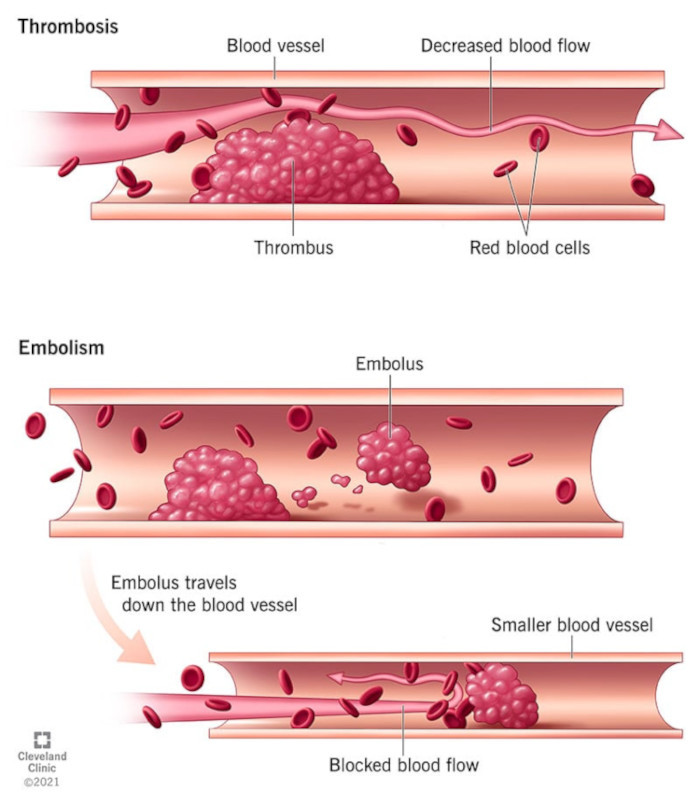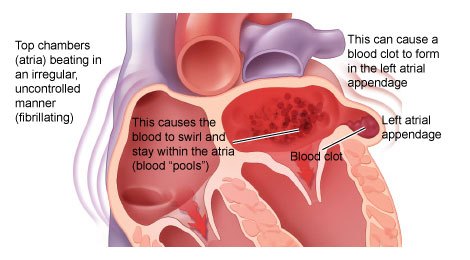
What exactly happens when a stroke hits? One way is clot formation(thrombus) leading to embolism (dislodged clot that travels through arteries). This is like a ball of clot that travels easily through big blood vessels of the body until it reaches the smaller blood vessels and gets trapped. It ‘clogs’ the small blood vessels that supply the needs of a particular part of the brain. It basically cuts the lifeblood of that part of the brain leading to brain ischemia (inadequate blood supply) which leads to malfunctioning of the many functions of the brain such as mobility (motor) and feeling (sensory). The question is what causes the clot in the circulation?
- Certain heart and blood conditions, such as atrial fibrillation and sickle cell disease.
- Chronic (long-term) inflammation.
- Atherosclerosis.
- Clotting disorders.
- Heart defects, such as atrial septal defect or ventricular septal defect.
- Microvascular ischemic disease, which can block smaller blood vessels in your brain.
- Fat emboli, which are clusters of fat particles circulating in your blood that get stuck in blood vessels in your brain.
One of the causes of blood clots in the body is atrial fibrillation commonly referred to as palpitation. And palpitation has many causes: genetics, heart problems (valves’ failures to close), certain arterial conditions, abnormality of the electric signals of the heart, metabolic disorders like thyroid abnormalities and diabetes and high blood pressure (there is a long list, but I don’t deal with Medicine in this discussion). These are mostly beyond one’s control and may need a doctor’s visit and management to be prescribed corrective and maintenance medications.
There are causes of palpitation that can be self-controlled: smoking, alcohol, over exercising, over stress, high blood sugar, lack of sleep, side effects of medications, high cholesterol that increase risk of fat emboli, lack of exercise, unhealthy diet, over fatiguing self (or pushing your 60-year-old self as if you were still in your 20s). These are the few causes of palpitation I can think of. There is one common denominator among all these causes: They are all dealing with lifestyle and habits. The solution is quite clear: stop smoking, drinking and eating a poor diet immediately. Focus on eating foods that increase good cholesterol (fish, veggies, grain etc.) as opposed to foods that increase bad cholesterol (fatty meats, fried foods, junk food, too much Mcdonalds, KFC and Burgers and pizza and chips lol). If you are diabetic, control the carbs and sugar (diabetic diet) and if you have a heart condition control the salt and fats (cardiac diet). To make it plain and simple, high blood pressure can be lowered by less salt and high blood sugar can be reduced by less sugar and carbs.
Ok, I am getting far ahead of myself here.
Afib or palpitation causes the failure of the upper chamber of the heart to completely drain the circulating blood to the lower chamber producing a small ‘pool’ of blood in the original chamber that can form into a clot. Eventually the clot forms into an embolus and will pass through the chambers and travel through blood vessels of the body. It may wander freely through the big vessels until it hits the small blood vessels of lungs(pulmonary embolism), heart (myocardial infarction) or brain (stroke).

During my clinical days, the moment a patient develops a palpitation, (especially if it is felt the first time) I request the patient be placed on bed rest until the medical team controls the palpitation. This is the stage when a patient is very susceptible to a clot and can lead to PE, MI or Stroke. Once the palpitation is under control, I can start my Physical Therapy program.
Atherosclerosis and Arteriosclerosis
Arteriosclerosis is a condition that means hardening of the wall of the blood vessel. Imagine a pipe that is originally pliable that adjusts its flexibility according to the pressure of water flow, compare that to a blood vessel. In arteriosclerosis, the walls lose their flexibility and pliability and are hardened. There is more stress on the blood vessels. It's worth repeating that the major culprits here are smoking, alcoholism, bad food, drugs, diabetes, high blood pressure (due to alcohol as one of many causes), high triglycerides and cholesterol. All these can damage the blood vessel walls, build up plaques leading to clots and emboli.
Atherosclerosis is a specific type of arteriosclerosis.
Atherosclerosis is the buildup of fats, cholesterol and other substances in and on the artery walls. This buildup is called plaque. The plaque can cause arteries to narrow, blocking blood flow.

Talking about cholesterol: Cholesterol is normally produced by the liver as we need it for formation of hormones such as testosterone needed by men, natural vitamins etc. The liver-produced cholesterol is sufficient enough for the body but then the types of food we eat add more of it to our system. There are three major types of cholesterol that we need to monitor: good cholesterol, bad cholesterol and cholesterol that deals with triglycerides (another bad one).
High-density lipoprotein (HDL) is considered good cholesterol. HDL moves cholesterol from different parts of the body back to the liver, so it can remove it from your body. The liver can break down the extra cholesterol.
A healthy amount of HDL in the blood can protect you from heart disease and stroke. However, HDL cannot remove all the excess cholesterol in your body. One of the easiest ways to build up good cholesterol is exercise (in moderation) and a good diet. A quick google search will recommend the following food for this purpose: fish, nuts, olive oil, veggies, fruits, well, most of us know these types of good food right now. Exercise is definitely a good means of building up good cholesterol.
Low-density lipoprotein (LDL) is considered bad cholesterol. LDL also moves cholesterol in your body. If there is too much LDL in your blood, then you have a higher risk of plaque forming in the arteries.
Avoid increasing this bad cholesterol at all costs. This is the scum that builds up at the inner wall of the blood vessel. It forms fatty deposits that can dislodge and develop into an embolus that can block the blood vessels leading to stroke (among others). Again, most of us know these types of food: fats from animals are usually bad (fatty portions of pork, beef, chicken), saturated fats from plants (like coconut oil - saturated oil usually hardens when refrigerated), fried food, a quick google would add these: Meat (the bad parts) Fish (the bad ones), Eggs, Saturated vegetable oils, Butter, Lard, Cheese, Yogurt, Other dairy products These aren’t bad as long as they are taken in moderation.
Very low-density lipoprotein (VLDL) is also considered bad cholesterol. It can lead to plaque forming in your arteries. However, VLDL is different from LDL because VLDL moves fat called triglycerides. Triglycerides come from converting the extra food you eat into fat.
This is where heavy portions of food leading to obesity is dangerous. The body stores extra food as fat. That is why people need to eat only enough or else try burning extra calories with exercises (moderate, please, when you are over 50 or 60). Also, diabetics can have too much sugar in the blood and that sugar needs to be stored as fat. The solution is always the same. Limit extra options of food, exercise to burn extra calories of food and for diabetics, control blood sugar by limiting extra carbs and exercising. Otherwise, try medicines to control it.
- If you have atherosclerosis in your heart arteries, it causes angina or chest pain, and a heart attack.
- If you have atherosclerosis in the arteries leading to your brain, it may lead to TIA which is a warning for a stroke later if untreated.
- If you have atherosclerosis in the arteries in your arms and legs, you may have pain in your legs (especially when walking) called claudication and decreased pressure in your legs. All these are symptoms of peripheral arterial disease.
- If you have atherosclerosis in the arteries leading to your kidneys, you may develop high blood pressure or kidney failure.
Although atherosclerosis is often considered a heart problem, it can affect arteries anywhere in the body. Atherosclerosis can be treated. Healthy lifestyle habits can help prevent atherosclerosis.